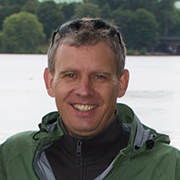A .gov website belongs to an official government organization in the United States.
A lock () or https:// means you've safely connected to the .gov website. Share sensitive information only on official, secure websites.

The faithful representation of tropical convection in weather and climate models remains one of most difficult tasks in atmospheric science. This is so, because the complex interactions of small-, meso- and large-scale processes that occur in convection need to be parametrized in those models. Much of the recent work in understanding the behavior of convection and in improving parametrizations has utilized high-resolution cloud models, with often only tenuous connections back to observations. This talk aims to illustrate the vastly underestimated potential of modern long-term observations to inform our understanding of tropical convection.
Since the 1990s, a research radar network around Darwin in tropical Australia has been instrumental in significantly improving our understanding of tropical convection. Its use has culminated in a unique, 16-year long data set for atmospheric convection research. We use this data set to examine the key ingredients of tropical convective cloud ensembles, such as cloud number, size, depth and in-cloud vertical motion and their relationship to the large-scale state of the atmosphere. We also combine the various radar observations to estimate the bulk precipitation efficiency of convection and its dependence on the larger scales.
We show that convective heating in an area is largely dominated by the fraction of the area that experiences convection. We show that the most intense convection is associated with large clouds that occur in a dry and often descending atmosphere, while the largest area-average rain results from a moderate number of moderate size clouds embedded in a humid and ascending atmosphere. Combining cloud-structure information with radar-based estimates of in-cloud vertical velocity, enables us to estimate convective mass-fluxes over long periods of time and large areas. We use this information to estimate the vertical structure of entrainment and detrainment and its relationship to the convective environment.
We briefly highlight how the inspiration drawn from the observations can be used to design innovative approaches to cumulus parametrization.
Professor Christian Jakob was awarded his PhD in Meteorology from the Ludwig Maximilian University, Munich, in 2001. As a research and senior research scientist for the European Centre for Medium-Range Weather Forecasts from 1993 to 2001, he worked on the development and evaluation of the model representation of clouds, convection and precipitation. From 2002 to 2007 he was Senior and Principal Research Scientist of the Australian Bureau of Meteorology and since 2007 he has been a professor at Monash University. He currently is the Chair of Climate Modelling at Monash\u2019s School of Earth, Atmosphere and Environment.
Prof Jakob's experience and current interests are in the development and evaluation of the processes crucial to the energy and water cycles in global atmospheric models. Internationally, he is engaged in many scientific and collaborative activities. He is the current Co-chair of the World Climate Research Programme's (WCRP) Modelling Advisory Council. He led the prestigious Working Group on Numerical Experimentation from 2008 to 2012 and was the first university-based researcher to be appointed in that position. He was Chair of the WCRP\u2019s Global Energy and Water Cycle Experiment (GEWEX) Modelling and Prediction Panel from 2007 to 2010. Before that, Prof Jakob successfully led the GEWEX Cloud System Study, in which a group of about 150 scientists collaborated on the development and evaluation of cloud and convection representation in models. He co-led the Tropical Warm Pool International Cloud Experiment in 2006.
As recognition of his prominent position in the climate science field, Prof Jakob was a lead author for the Intergovernmental Panel on Climate Change (IPCC) 5th Assessment Report, Working Group 1. In 2016, his research was recognized by the Ascent Award of the American Geophysical Union's Atmospheric Sciences Section.
ALL Seminar attendees agree not to cite, quote, copy, or distribute material presented without the explicit written consent of the seminar presenter. Any opinions expressed in this seminar are those of the speaker alone and do not necessarily reflect the opinions of NOAA or CSL.